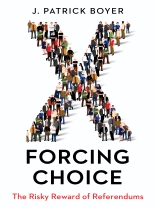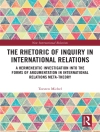The Hill Times: Best Books of 2017
What happens when crucial public issues are decided the people themselves?
Canadians answered “Yes” or “No” to prohibiting alcohol, conscripting soldiers, and revamping our constitution. Forcing such crucial choices at the ballot box is high-stakes democracy, both here and overseas — as witnessed with Britain’s transformative 2016 “Brexit” referendum.
Forcing Choice dissects Canada’s extensive use of ballot questions at all levels of government, and weighs the benefits of citizens making fundamental decisions for the nation. Holding referendums is tricky, and getting it wrong carries a high price.
This hard-hitting book draws on Boyer’s deep research on direct democracy and his experience advising governments about referendums, writing books, drafting and introducing the Canada Referendum Act, monitoring foreign referendums, and campaigning in Canadian ones.
Jadual kandungan
Foreword by Peter Russell
On Democracy
Preface: A Word About Words
1 High-Risk Democracy
2 Anvil of a Self-Governing People
3 Our Own Democratic Landscape
4 The Sovereign People of Canada
5 Referendum Law Normalizes Democratic Life
6 Referendums in Harmony with the Constitution
7 Charter Protection of Minority Rights
8 Just What Constitutes a “Majority”?
9 No Such Thing as “Direct Democracy”
10 Referendums and Elections: Alike, Yet So Different
11 “Mandates” from the People
12 How Hard Is Asking a Clear Question?
13 Aren’t Some Issues Just Too Complex?
14 To Vote on the Principle, or the Package?
15 Continuing Adult Education
16 Referendums Reveal, Do Not Create, Divisions
17 Voting on Democracy
18 Voting to Ratify, Join, and Subdivide Confederation
19 Voting to Break Confederation: Round One, 1980
20 Voting on Confederation’s Makeover: Getting to the Charlottetown Accord
21 Voting to Break Confederation: Round Two, 1995
22 Voting on Prohibition
23 Voting on Conscription
24 Voting on Aboriginal Questions
25 Voting on Women’s Rights
26 Voting on Food Supply Issues
27 Balloting on Everything from Time of Day to a Fixed Link
28 Democratic Accountability Through Municipal Ballot Questions
29 Canada’s Place in a Universe of Referendums
30 Rewards of Citizen-Centred Democracy
Appendix: Canadian Ballot-Issue Votes: National, Provincial, Territorial
Acknowledgements
Notes
Bibliography
Index
Mengenai Pengarang
J. Patrick Boyer studied law at the International Court of Justice in The Netherlands, served as Canada’s Parliamentary Secretary for External Affairs, and works for democratic development overseas. The author of twenty-three books on Canadian history, law, politics, and governance, Patrick lives with wife, Elise, in Muskoka and Toronto.












